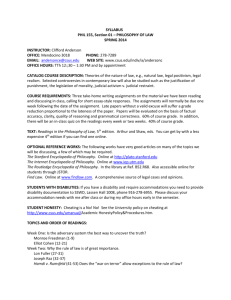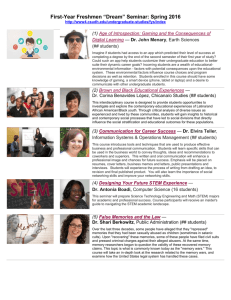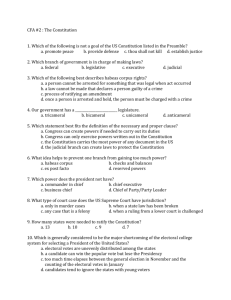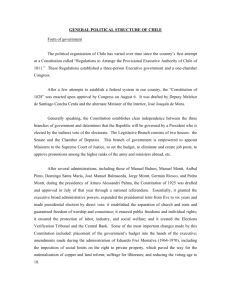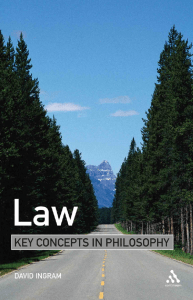SYLLABUS
advertisement
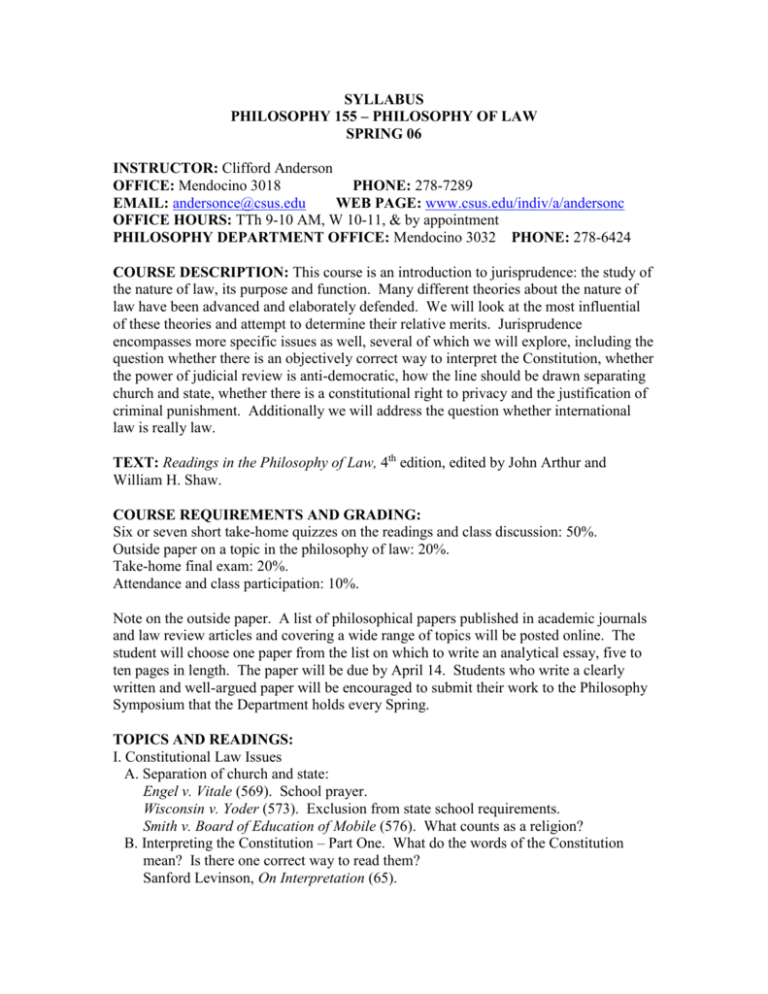
SYLLABUS PHILOSOPHY 155 – PHILOSOPHY OF LAW SPRING 06 INSTRUCTOR: Clifford Anderson OFFICE: Mendocino 3018 PHONE: 278-7289 EMAIL: andersonce@csus.edu WEB PAGE: www.csus.edu/indiv/a/andersonc OFFICE HOURS: TTh 9-10 AM, W 10-11, & by appointment PHILOSOPHY DEPARTMENT OFFICE: Mendocino 3032 PHONE: 278-6424 COURSE DESCRIPTION: This course is an introduction to jurisprudence: the study of the nature of law, its purpose and function. Many different theories about the nature of law have been advanced and elaborately defended. We will look at the most influential of these theories and attempt to determine their relative merits. Jurisprudence encompasses more specific issues as well, several of which we will explore, including the question whether there is an objectively correct way to interpret the Constitution, whether the power of judicial review is anti-democratic, how the line should be drawn separating church and state, whether there is a constitutional right to privacy and the justification of criminal punishment. Additionally we will address the question whether international law is really law. TEXT: Readings in the Philosophy of Law, 4th edition, edited by John Arthur and William H. Shaw. COURSE REQUIREMENTS AND GRADING: Six or seven short take-home quizzes on the readings and class discussion: 50%. Outside paper on a topic in the philosophy of law: 20%. Take-home final exam: 20%. Attendance and class participation: 10%. Note on the outside paper. A list of philosophical papers published in academic journals and law review articles and covering a wide range of topics will be posted online. The student will choose one paper from the list on which to write an analytical essay, five to ten pages in length. The paper will be due by April 14. Students who write a clearly written and well-argued paper will be encouraged to submit their work to the Philosophy Symposium that the Department holds every Spring. TOPICS AND READINGS: I. Constitutional Law Issues A. Separation of church and state: Engel v. Vitale (569). School prayer. Wisconsin v. Yoder (573). Exclusion from state school requirements. Smith v. Board of Education of Mobile (576). What counts as a religion? B. Interpreting the Constitution – Part One. What do the words of the Constitution mean? Is there one correct way to read them? Sanford Levinson, On Interpretation (65). Tony Honore, Interpretation (80). Kentucky v. Whitt (84). Who is a drunk driver? C. Gay Rights Lawrence v. Texas (589). Anti-sodomy laws. Goodridge v. Massachusetts Department of Public Health (596). Gay Marriage. Lawrence Tribe and Richard Parker, Judicial Activism and Gay Marriage: A Debate (605). D. Doctrine of precedent (stare decisis). When can prior judicial rulings be overruled? Cass Sunstein, Reasoning by Analogy (91). C. Gordon Post, Stare Decisis: The Use of Precedent (93). Regina v. Morgan, Rape, Consent, and “Mens Rea” (102). E. Interpreting the Constitution – Part Two. (i) Who should have final say on what the Constitution means: the Courts? The Legislature? The General Public? Alexander Hamilton, The Federalist, #78 (529). John Arthur, Democracy, Judicial Review, and the Special Competency of Judges (555). (ii) How should the Constitution be interpreted? The debate over originalism vs. activism. William Rehnquist, The Notion of a Living Constitution (540). Ronald Dworkin, Constitutional Cases (596). II. Criminal Law A. Is the adversary system the best way to determine criminal guilt? Monroe Freedman, Lawyer’s Ethics in an Adversary System (2). John H. Langbein, An Alternative to the Adversary System (10). Kenneth Kipnis, Criminal Justice and the Negotiated Plea (269). B. The Rights of Defendants James McCloskey, Convicting the Innocent (276). Carl B. Klockars, The Dirty Harry Problem (284). Malcolm R.Wilkey and Stephen H. Sachs, A Debate on the Exclusionary Rule (292). Miranda v. Arizona, Brewer v. Williams, Rhode Island v. Innis, Interrogation and the Right to Counsel (302). C. Aspects of Criminal Responsibility Richard B. Brandt, The Principles of Criminal Law (347). H.L.A. Hart, Intention (352). Leo Katz, Attempting the Impossible: The Crime That Never Was (358). State v. Leidholm, The Battered Woman Syndrome (365). Susan Estrich, Rape, Force and Consent (368). D. The Many Attempts to Justify Criminal Punishment Richard B. Brandt, The Utilitarian Theory of Criminal Punishment (246). Herbert Morris, Persons and Punishment (252). Jean Hampton, The Moral Education Theory of Punishment (259). Randy E. Barnett, Restitution: A New Paradigm of Criminal Justice (263). III. International Law H.L.A. Hart, International Law (182). The International Military Tribunal at Nuremburg (192). IV. Theories About the Nature of Law Brian Bix, Traditional Natural Law Theory (112). Jerome Frank, Realism and the Law (139). H.LA. Hart, Law as the Union of Primary and Secondary Rules (155). Ronald Dworkin, The Model of Rules (161). Robert W. Gordon, Critical Legal Studies (213). Andrew Altman, Critical Legal Studies and Dworkin (231).
